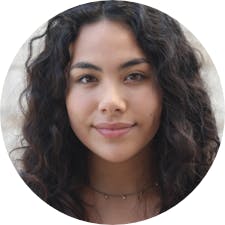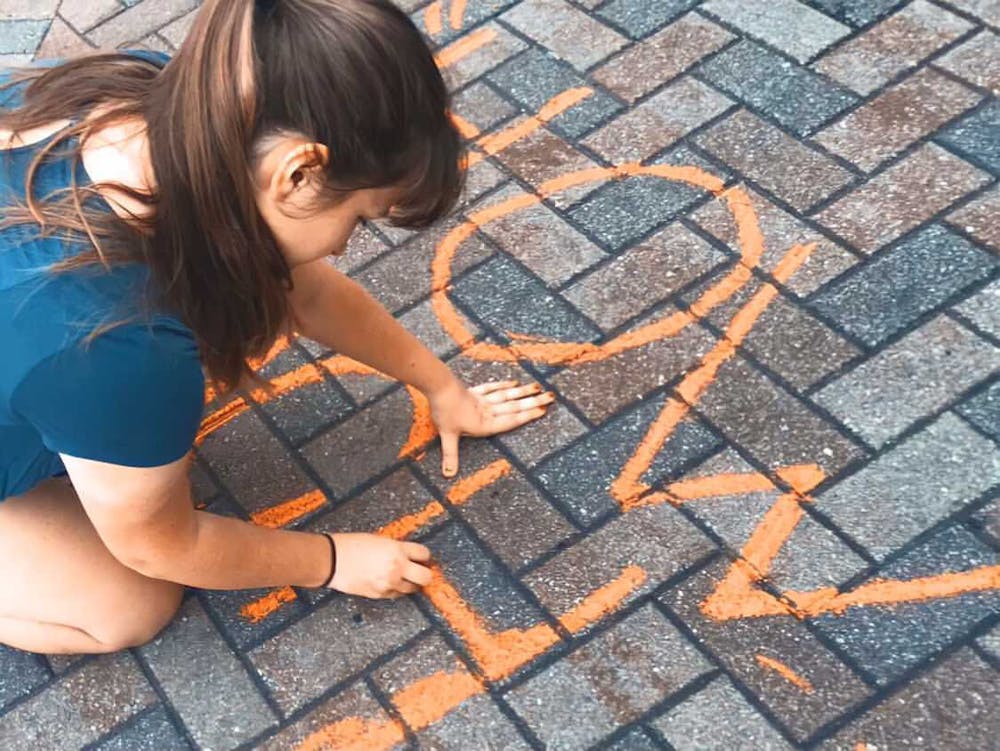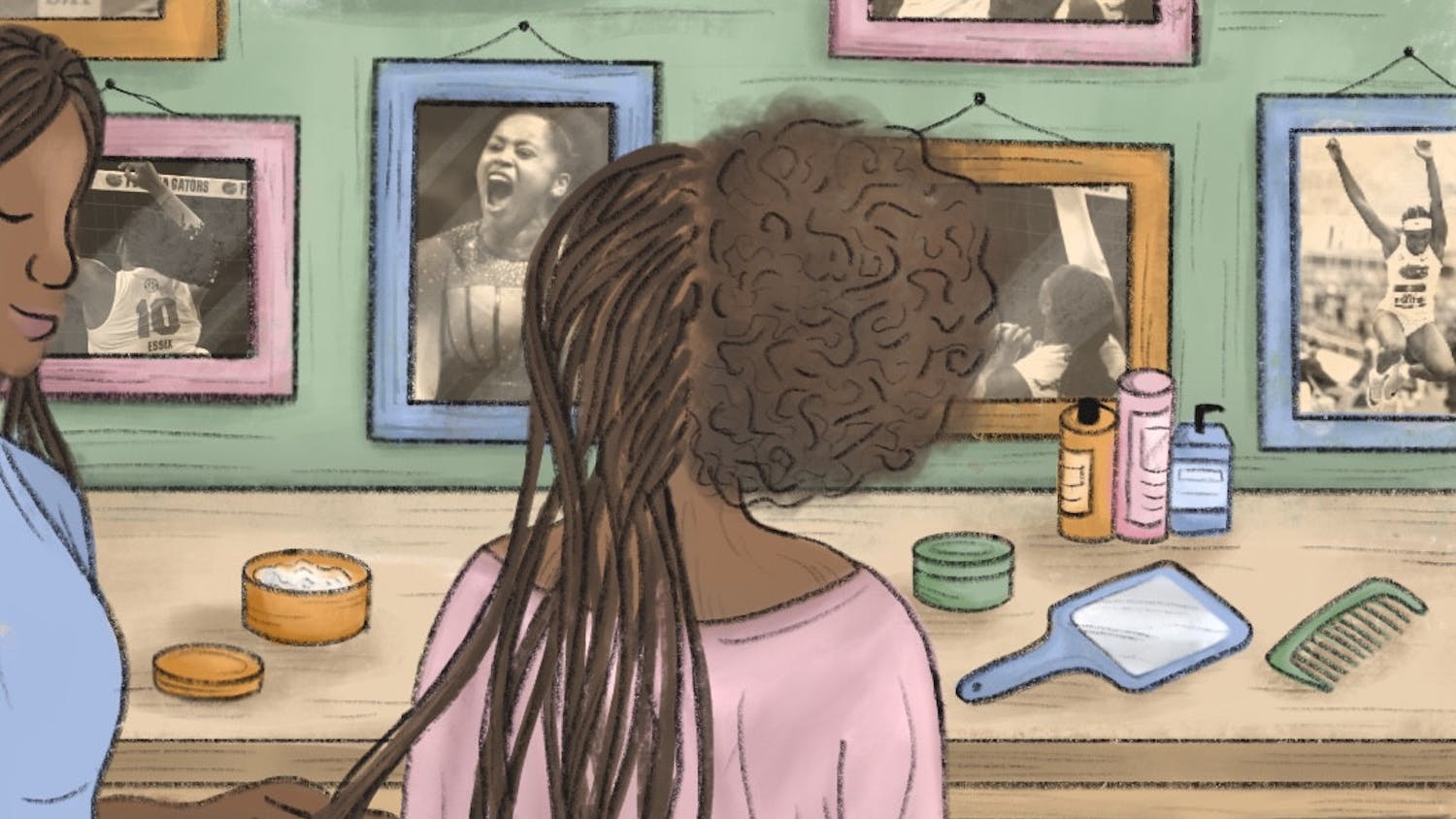Chalked in vibrant colors on the sidewalks of Gainesville are the words: “Are you single? Let’s go to a hotel now.” “Nice green hair. Would love to pull on it.” “Blow that whistle, baby.”
These phrases have been shouted at community members while walking on the streets, and the group Catcalls of Gainesville, FL, is on a mission to bring these instances of street harassment to light through sidewalk chalking.
The organization documents the chalking they’ve done in response to the instances of catcalling on Instagram, and they have garnered more than 1,000 followers since its inception.
UF ecology senior Sam and UF biology sophomore Zoya are two of four students behind this mission. Due to harassment and online threats directed at the Catcalls of Gainesville Instagram account, they have asked to withhold their last names.
Sam described catcalling as sexually objectifying statements or threats said or yelled at someone when walking out in public.
Sam added she founded Catcalls of Gainesville in May 2019 after she personally experienced street harassment downtown.
“I was really annoyed by it,” she said. “But I didn't always feel like I could respond to them because I didn't feel safe to do that.”
After multiple personal instances of street harassment, Sam discovered Catcalls of NYC, where activists were using chalk to write the phrases on the sidewalks in the same location they were heard.
“The first time I chalked, it was kind of difficult, but it kind of helped me gain power back over the situation,” she said. “Because when you get catcalled you feel so disempowered, so the act of doing it was very cathartic.”
Zoya, too, experienced her own occurrence of catcalling, which motivated her to join the organization.
“I had a pretty frightening catcalling experience of my own that was actually very close to campus,” she said. “I was walking back from a parking garage with a few of my friends. In the moment you're just kind of like, ‘okay, I'm just going to ignore, ignore, ignore.’ It's almost like that kind of fight or flight response.”
When chalking the phrases throughout Gainesville, Sam said Midtown has been a common spot where harassment occurs, particularly around the bars. But she added that street harassment is not limited to just the nighttime, and it could happen anywhere and any time.
UF graduate photography student Marina Sachs, 27, submitted a story to Catcalls of Gainesville about being sexually harassed for having tattoos, which they said is something they experience a lot as a “femme presenting person.”
“The specific encounter I submitted happened in the airport last year when an unknown man noticed my hand tattoos and said, ‘did you get those drunk?” to which I replied, ‘nah, I'm sober,’ and he said, ‘wow, a girl like you got those sober?’ effectively misgendering me, diminishing my sobriety and harassing me as I was minding my own business in the airport.”
Written in purple and yellow chalk, the sidewalk read, “Hey, were you drunk when you got all those tattoos? A girl like you got those sober?!”
Once seeing their story in chalk, Sachs said they were curious if other tattooed or nonbinary folks who have experienced sexual harassment or fetishization around their tatoos saw the phrase on the sidewalk.
“Sexual harassment is part of a larger hetero-patriarchal system that works closely with white supremacy, transphobia, and racism,” they said. “How I experience sexual harassment as a white, able-bodied nonbinary femme is different than how my nonbinary masc partner of color does.”
Sachs added that the sexual street harassment in Gainesville stems from a larger origin.
“I think any community needs to look to their intersectional feminist community leaders, look to women of color and queer and trans organizers who disproportionately experience sexual harassment and violence,” they said.
Sachs said they look forward to how the Catcalls of Gainesville account will call attention to the spaces where sexual harassment occurs.
“I hope that folks who have been harassed can see and know they are not alone,” they said.
Sam said the organization has received mixed feedback since starting.
“There has been definitely negative backlash from a few people saying, ‘Oh, it's a compliment,’ or just like trolls online who say, ‘you're demonizing men in some way,’” she said. “We're not trying to do that at all. I think that's a common misconception. You can be supportive of feminist groups and be a man. You can be a male feminist, like it's not exclusive to any gender or sex.”
Despite the feedback, Sam and Zoya both mentioned the empowerment and awareness they hope to provide people with, emphasizing the idea of giving power back.
Catcalls of Gainesville continues to post resources and hotlines on their Instagram page for those who need support after being harrassed. They encourage people to share their stories to raise awareness, and they handle each submission with care, keeping identifying information anonymous if preferred.
Sam and Zoya said they hope to expand Catcalls of Gainesville in efforts to raise awareness and provide resources regarding sexual street harassment. They said they hope to connect with local artists and 352 Walls to create a mural as a permanent and physical reminder, as opposed to chalk that is temporary and can wash away.
“A lot of times when we go into public spaces, we're being judged in some way or sexualized in some way, so reclaiming it with the chalk, and reclaiming it with art, it's a way of making that space ours again, in creating a safe community for everyone.”
Contact Kristin Bausch at kbausch@alligator.org. Follow her on Twitter @BauschKristin.

Kristin Bausch is a third-year journalism major at the University of Florida and a staff writer with the Avenue. Giving people an opportunity to share their story is one of her favorite things about writing. When not writing, she’s probably dancing.






